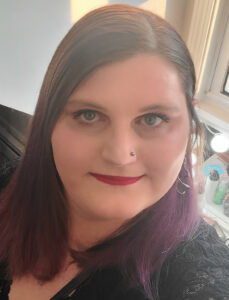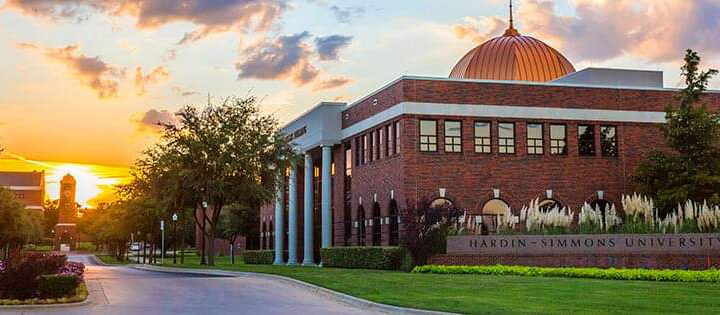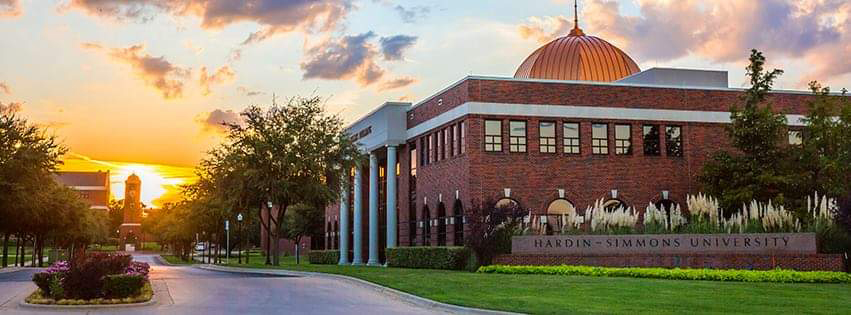Catchy headline, right? You may be asking how it was possible that a trans person could even begin to thank a conservative Christian university. No, this is not another piece on how conservative evangelical Christianity made my life so bad that I finally understood I was transgender and gay.
That is a part of my story, but it is not the whole thing. Let me take you back to 2010. That was the height of the Passion Conferences; John Piper and Louie Giglio were going strong; the contemporary worship scene was rocking; and the battles between Mark Driscoll and Emergent village celebrities such as Doug Pagitt and Brian McLaren were brewing over the theological heart of the post-evangelical.

Triss Ingels
I was a college senior about to graduate with a degree in theology from Hardin-Simmons University when a curious event took shape. News spread that the group Soulforce was going to be stopping in Abilene to protest for LGBTQ rights at McMurry, Abilene Christian and Hardin-Simmons universities.
Dialogue or protest
Soulforce is a group that would periodically go to conservative Christian campuses and give the university a choice either to sit down and talk about LGBTQ inclusion or to become the target of a protest on their campus for discriminatory practices and anti-LGBTQ policies. Soulforce was notorious among evangelical colleges as instigators, far-left activists, and above all heretics. So, when Soulforce came to Abilene, the three schools there had a choice: They could ignore their requests to meet and risk the political backlash of a high-profile demonstration or allow Soulforce on campus to talk with students, faculty and administration.
“Our church of Christ neighbors at Abilene Christian University decided they would forgo conversations and, just as expected, Soulforce picketed and protested on their campus.”
Our church of Christ neighbors at Abilene Christian University decided they would forgo conversations and, just as expected, Soulforce picketed and protested on their campus. HSU opted to allow Soulforce on campus. A delegation was developed made up of faculty, administration and students. I was one of those students on the delegation to welcome Soulforce and facilitate ongoing conversations.
The day came, and Soulforce was invited to campus. At the time, I was taking a class on human sexuality as well as a class on Christian sexual ethics. Our professors thought it important for the whole class to attend the presentation. I remember getting ready to sit down next to my then-girlfriend when the procession of gays entered. Two presenters went to the front, and the rest of the delegation dispersed among us.
One student stood out
There was, however, one student who stood out from the rest of the rainbow party. This person was not a typical “gay,” they were clad in women’s clothing but did not appear to be a typical “woman.” It was as if the heavens opened that day and gave me the sign of the rainbow when this marvelous human plopped down next to me.
We had all seen gay people, we even knew some of our classmates who were gay, but this individual was different. They not only defied the sexual norms that were so ingrained in evangelical culture, but they went further and transgressed the very nature of gender itself. I never had met anyone like this. As you can probably guess, this person was transgender. I had heard and even seen trans people in the media, but this was the first time I ever saw a trans person in real life.
“This was the first time I ever saw a trans person in real life.”
I couldn’t keep my eyes off this person.
The presentation went on and, as one might expect, Soulforce gave its presentation, which was followed by plenty of comments from students and faculty about how the Bible forbids homosexuality and that there are only two distinct genders. I remember piping up and quoting a passage from Dietrick Bonhoeffer about loving the “other” and how we should listen to the people here because they had something to say to us.
After the presentation, we all went back to our classes and life continued. But I mark that day as a crucial turning point in my life, not because of the convincing arguments of Soulforce but the pure defiance of this one individual to live their life authentically.
Importance of dialogue
I recount this story as a way of introducing the importance of theological dialogue and as a thank you to the faculty and administration of Hardin-Simmons University for fostering a community where it was possible to be acquainted with ideas that were different than our evangelical heritage. It pains me to no end to see that HSU has adopted a new Statement of Faith that is specifically written to exclude transgender, intersex people as well as anyone who is not heterosexual. This is no surprise to many of us Logsdon and Hardin-Simmons alumni who have seen the deterioration of our once-beloved university into the abyss of fundamentalism.
The accounts of the conservative takeover of HSU with the hiring of Eric Bruntmyer, the gutting of the music and other fine arts departments, and the closure of Logsdon Seminary are well documented. Many of us watched knowing this was how it was going to end. I knew as soon as Bruntmyer was elected president that HSU was done being an institution of “education enlightened by faith” and just another evangelical Christian indoctrination tool.
The new Statement of Faith
I want to offer a few brief critiques of the new Statement of Faith because this change of course is personal to me as a transgender alumna of HSU.
“The new Statement of Faith takes a hard stance against any possibility of LGBTQ inclusion.”
The new Statement of Faith takes a hard stance against any possibility of LGBTQ inclusion. It states, “We believe that marriage has been established by God to be a life-long, covenant relationship between one genetic male and one genetic female. We also believe that sexual activity is intended by God to be expressed solely in the context of a loving marriage between one genetic male and one genetic female.”
By using the word “genetic,” the Statement of Faith forgoes religious language in favor of a more scientific explanation. Thus, we should be free to critique the message based on scientific research. On that point, science is clear in refuting the idea that there are two genetic or biological sexes. Most scientists argue that there are at least six possible combinations of X/Y chromosomes, which is why we have intersex people.
The authors of the HSU statement have worked themselves into a theological corner. If there are only two sexes, how do you explain intersex conditions? One quick answer might be, “Well those are not ‘normal’ and are few in reality.” Yet we know this is not the case. We know about 1.7% of the world population is born with an intersex trait, about the same percentage as people with red hair. So either there are not two sexes or you have to seriously question the quote later on in the Statement: “We believe that every person has been fearfully and wonderfully made by God and should be afforded love, kindness, compassion and dignity.”
“If there are only two sexes, how do you explain intersex conditions?”
This is a reference to the often-quoted Psalm 139:13-14. However, if we take this Scripture as the writers of the HSU statement want us to, then we are in a theological gray area. Are intersex people fearfully and wonderfully made? If they are, then how does that work together with there only being two sexes? Do you see the theological fallacy?
Evangelicals have worked themselves into a theological quandary. Either you must accept that there are more than two sexes or else you have to admit at some level God screwed up. Now you might say that intersex traits are a result of the fall, but then you must contend with the age-old theological question of whether God predestines people to sin and hell, because intersex babies have no choice in the matter.
In addition, it is apparent that sex and gender are socially constructed. Gender norms have changed dramatically since the writing of the New Testament. In addition, we know the New Testament wasn’t as clear cut on matters of genetic gender. Eunuchs, for instance, were seen as a third gender by many in biblical times.
Sex and gender are ever changing and morphing. The idea of two genders is a recent development in the course of history and also is steeped in white supremacy, hegemonic patriarchy and racism. For many years, other cultures have recognized other genders, and it is only through acts of violence and colonialism that they have been shunned or forgotten.
Gender and sex are not meant to be rigid structures of absolute control, but free for people to decide and recognize themselves.
Thus, the HSU statement is not as clear-cut as it might seem.
Wrong side of history
More importantly, however, the new Statement of Faith places HSU firmly on the wrong side of history. Conservative Baptist sexual ethics are finally being shown for their moral and theological bankruptcy. We’ve all seen the horror stories coming out of the Southern Baptist Convention.
“What HSU is doing is continuing to inflict violence and discrimination upon LGBTQ students, administration and faculty.”
What HSU is doing is continuing to inflict violence and discrimination upon LGBTQ students, administration and faculty. By entrenching themselves in their theological conservative ideology, they perpetuate violence and harm to the students who are terrified to be themselves.
LGBTQ youth make up the nation’s largest population of suicide attempts. This ideology is killing people, and that blood and pain are in the hands of faith institutions that continue to perpetuate hate and bigotry.
It pains me that my alma mater, once a place that allowed me to think critically not only about my faith but about my sexuality and gender, no longer allows such freedom. It was precisely the faculty and administration at HSU who gave me the freedom to be my true and authentic self.
I easily could have been another statistic of an LGBTQ person who died by suicide. However, it was the love, encouragement and deep commitment to education informed by faith at HSU that kept me from that end.
Today, Baptists and evangelicals stand at the precipice of a theological cliff. They can continue to hurdle closer to the edge, wreaking havoc, trauma and death in their wake, or they can begin to listen just as the faculty and administration of HSU did 12 years ago.
As we enter Pride month, we see that LGBTQ people are here, we are proud, and we will no longer stand by and have religious institutions destroy us. We are ready to fight if need be, but we are lovers at heart. Let’s image a new world a world where we can all be God’s children and where we can all explain with joy that we are fearfully and wonderfully made.
Triss Ingels is a queer, transgender, non-binary theologian and activist. They hold a bachelor of behavior science degree in theology and computer science from Hardin Simmons University, a master of theological studies degree from Southern Methodist University and a master of sacred theology degree from Boston University, in addition to a graduate certificate in gender and sexuality from Boston University. Follow them at trissingels.com.
Related articles:
West Texas Baptist university adopts new faith statement with strict emphasis on gender and marriage
Grieving Logsdon supporters fear female prof a victim of conservatives behind seminary’s closure


